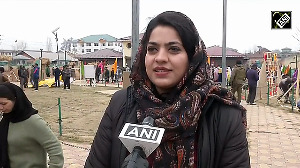Mumbai-based Union Bank of India is to be merged with the Bank of India, a marriage that will create India's second largest commercial bank after the State Bank of India. The new entity, to be christened Union & Bank of India, is expected to be launched on April 1, 2005.
The finance ministry is believed to have agreed to the merger, which was proposed early this calendar year and received the green light from the previous government.
"Had the old government come back to power, the merger would have taken place by this time," a source close to North Block told Business Standard.
Finance Minister P Chidambaram, who flagged off the issue of banking sector consolidation during the Indian Banks' Association annual general meeting in August, was happy with the merger proposal, the source added.
The merged entity will have an asset base of over Rs 1,43,000 crore (Rs 1,430 billion) and will be the second largest commercial bank in the country, overtaking ICICI Bank. It will have a network of 4,582 branches and over 68,000 employees.
According to the plan, around 200 branches of the new entity will be closed down while 500 new ones will be opened to tap new businesses.
This will take the total number of branches to 4,882 and translate into an annual saving of Rs 300 crore (Rs 3 billion) for the new entity. The Boston Consulting Group is working on the integration plan.
According to sources, there is no plan to cut the workforce as excess staff will be redeployed to generate new businesses. There will not be any problem on the technology front as both banks operate on Infosys' Finacle as their core banking application platform.
Bank of India has 19 branches and three representative offices across four continents with presence in all major financial centres, including London, New York, Paris, Tokyo, Singapore and Hong Kong. Since Union Bank will merge with Bank of India, the new entity will not have to seek fresh licences.
"This is one of the reasons why Union Bank is being merged with Bank of India, as otherwise it would have to surrender the overseas licences," sources said.
Sources said both banks are expected to call the respective board meetings on the proposed merger in November in accordance with the rules laid down by the Banking Companies (Acquisition and Transfer of Undertakings) Act, 1970.
Once the merger scheme is prepared, minority shareholders will be given a month to raise objections, if any, to the proposal. Following this, the Cabinet's approval will be sought.
The appointed date of the merger is expected to be April 1, 2005. Bank of India chairman M Venugopalan is set to step down on March 31 when his term expires. The new chairman, who will succeed Venugopalan, will take charge of the merged entity.
Ever since Union Bank chairman V Leeladhar took over as the Reserve Bank's deputy governor, the bank is being run by its executive director, Ratnakar Hegde.
Venugopalan was not available for comment. Asked about the merger a fortnight ago, he had told Business Standard, "It's too premature." The bank's executive director M Balachandran said, "Nothing is concrete." He said the bank had appointed the Boston Consulting Group for business process reengineering.
Union Bank executive director K Rathnakar Hegde had on Sunday said in Kochi that his bank was on the lookout for acquiring a bank that had operations abroad. He said merchant bankers were being approached to identify the target.
When contacted, Hegde said he was not aware of the current development. Former Union Bank Chairman Leeladhar had last month hinted that Union Bank was looking to acquire a bank with an international presence.
Vinod Rai, additional secretary in the finance ministry's banking division, has been overseeing the proposal.
According to ministry sources, the minutest details of the merger have been finalised. Union Bank of India's emblem, the sun, will give away to Bank of India's star, and the new entity will be headquartered in Mumbai's Bandra Kurla Complex. Which means Union Bank's plan to set up its headquarters at the complex will be shelved.




 © 2025
© 2025